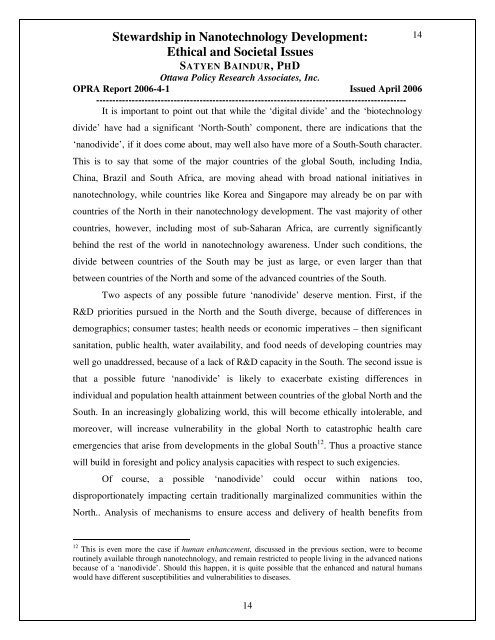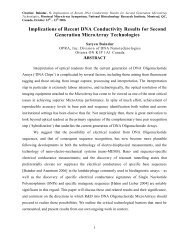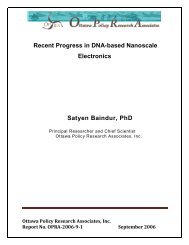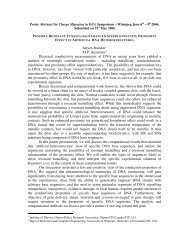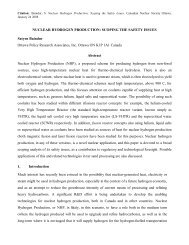Development Ethical and Societal Issues Satyen Baindur PhD
Ethical and Societal Issues - Satyen.Baindur.Org
Ethical and Societal Issues - Satyen.Baindur.Org
You also want an ePaper? Increase the reach of your titles
YUMPU automatically turns print PDFs into web optimized ePapers that Google loves.
Stewardship in Nanotechnology <strong>Development</strong>:<br />
<strong>Ethical</strong> <strong>and</strong> <strong>Societal</strong> <strong>Issues</strong><br />
SATYEN BAINDUR, PHD<br />
Ottawa Policy Research Associates, Inc.<br />
OPRA Report 2006-4-1 Issued April 2006<br />
------------------------------------------------------------------------------------------------<br />
It is important to point out that while the ‘digital divide’ <strong>and</strong> the ‘biotechnology<br />
divide’ have had a significant ‘North-South’ component, there are indications that the<br />
‘nanodivide’, if it does come about, may well also have more of a South-South character.<br />
This is to say that some of the major countries of the global South, including India,<br />
China, Brazil <strong>and</strong> South Africa, are moving ahead with broad national initiatives in<br />
nanotechnology, while countries like Korea <strong>and</strong> Singapore may already be on par with<br />
countries of the North in their nanotechnology development. The vast majority of other<br />
countries, however, including most of sub-Saharan Africa, are currently significantly<br />
behind the rest of the world in nanotechnology awareness. Under such conditions, the<br />
divide between countries of the South may be just as large, or even larger than that<br />
between countries of the North <strong>and</strong> some of the advanced countries of the South.<br />
Two aspects of any possible future ‘nanodivide’ deserve mention. First, if the<br />
R&D priorities pursued in the North <strong>and</strong> the South diverge, because of differences in<br />
demographics; consumer tastes; health needs or economic imperatives – then significant<br />
sanitation, public health, water availability, <strong>and</strong> food needs of developing countries may<br />
well go unaddressed, because of a lack of R&D capacity in the South. The second issue is<br />
that a possible future ‘nanodivide’ is likely to exacerbate existing differences in<br />
individual <strong>and</strong> population health attainment between countries of the global North <strong>and</strong> the<br />
South. In an increasingly globalizing world, this will become ethically intolerable, <strong>and</strong><br />
moreover, will increase vulnerability in the global North to catastrophic health care<br />
emergencies that arise from developments in the global South 12 . Thus a proactive stance<br />
will build in foresight <strong>and</strong> policy analysis capacities with respect to such exigencies.<br />
Of course, a possible ‘nanodivide’ could occur within<br />
14<br />
nations too,<br />
disproportionately impacting certain traditionally marginalized communities within the<br />
North.. Analysis of mechanisms to ensure access <strong>and</strong> delivery of health benefits from<br />
12 This is even more the case if human enhancement, discussed in the previous section, were to become<br />
routinely available through nanotechnology, <strong>and</strong> remain restricted to people living in the advanced nations<br />
because of a ‘nanodivide’. Should this happen, it is quite possible that the enhanced <strong>and</strong> natural humans<br />
would have different susceptibilities <strong>and</strong> vulnerabilities to diseases.<br />
14


